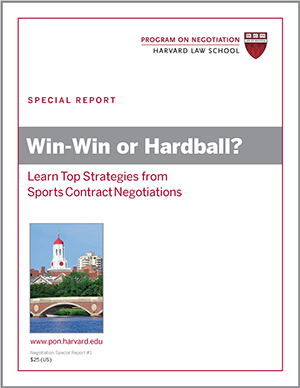
We tend to view job negotiations as battles over a fixed pie of resources: A higher salary for the employee means lower profits for the employer. More vacation time equals lowered productivity, and so on.
But employment negotiations can lead to win-win agreements. If an entrepreneur can’t afford office space, she will benefit from hiring employees who prefer to work at home. In that case, the parties have compatible preferences. Even when their preferences aren’t compatible, the two sides can make tradeoffs across issues to reach satisfying agreements: an employee who wants more vacation time might volunteer for a responsibility that others have shunned, for example.
As the city of Detroit tries to dig itself out of bankruptcy, negotiations with its unions have resulted in a so-called “hybrid” pension system that some are calling a win-win deal—though it does require compromise and sacrifice.
For many years, Detroit city workers have reaped generous pensions that kick in at age 55 and include annual cost-of-living increases, an extra check in December, and bankable sick leave. Taxes were unable to keep up with these growing costs, a key reason for the city’s collapse, writes Mary Williams Walsh in the New York Times.
As part of a plan to bring Detroit out of bankruptcy, the city’s emergency manager, Kevyn D. Orr, unveiled the hybrid pension system on June 18, 2014. Under the system, which took effect on July 1, the city would attempt to reduce its estimated $3.5 billion pension funding shortfall by requiring city workers to pay into their pensions for the first time. Most will have to contribute 4% of their pretax weekly salary to their retirement funds, a figure that will be higher for police, firefighters, and new employees. The pension deductions could be offset by salary increases aimed at restoring workers’ 2010 pay levels, the Wall Street Journal reports.
Unlike in a traditional 401(k) retirement plan, Detroit workers will still earn monthly payments from the city. But like a 401(k), the hybrid system hands off some investment risk to workers and encourages them to invest responsibly. The system also puts in place eight “levers” that the city can pull if the plan runs into trouble, including a reserve fund to cover losses and the ability to raise workers’ required contributions. All eight levers would have to be pulled before Detroit taxpayers would be responsible for rescuing the plan again.
Detroit’s unions are currently appealing a ruling that pensions can be cut as part of a rebuilding plan. But as the Times writes, the features of the hybrid pension system give “both the city and the unions an opportunity to declare victory and provides Mr. Orr with ammunition” to argue in federal court in August that Detroit is equipped to exit bankruptcy—a potentially win-win deal.
For the city to move forward, Detroit workers and pensioners will have to acknowledge that refusing to make concessions will keep the city mired in bankruptcy. As Detroit’s plight suggests, sometimes in negotiation, a win-win deal is one that avoids further disaster rather than one that leaves all parties in a celebratory mood.
Related Win Win Negotiations Article: Negotiation Case Studies: Reciprocity at the Bargaining Table – How to Use Tradeoffs to Create Value in Integrative Negotiation Scenarios
Originally published in 2014.




